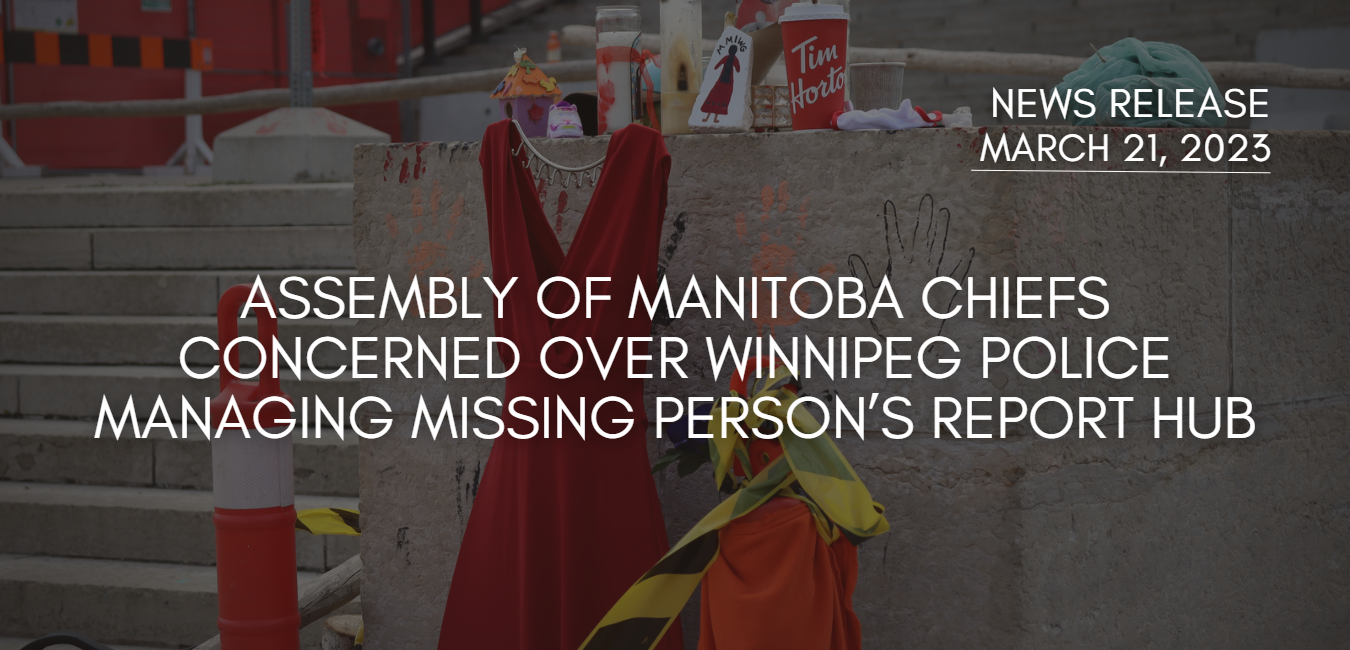Assembly of Manitoba Chiefs Concerned Over Winnipeg Police Managing Missing Person’s Report Hub

March 21, 2023
Treaty One Territory, Manitoba
AMC Communications
Treaty One Territory, Manitoba – The Assembly of Manitoba Chiefs (AMC) responds to the government of Manitoba announcing 2.1 million dollars in funding for the Integrated Missing Persons Response unit to be controlled by the Winnipeg Police Service (WPS).
“We have little faith that the Winnipeg Police Service can handle a hub for our missing loved ones,” said Grand Chief Cathy Merrick. “Families of missing persons feel time and time again that the police do not prioritize their cases and lack proper effort and cooperation with communities. The WPS has already had oversight on these files for decades, which has not served us well. As well, this announcement came without proper consultation of our First Nations and our regional political office which is currently working with a number of organizations, including the WPS, the RCMP and the Province on searching for loved ones in landfills. One would assume they would have come to us to share this news before it was announced.”
The WPS has already proven that the resources they were given for Missing and Murdered Indigenous Women and Girls (MMIWG) have been expended without any notable improvement on the issue. And now they will receive more funds and control over information collection about MMIWG2S+ cases. The First Nations Family Advocacy Office (FNFAO) has submitted a proposal and received approval to create an MMIWG2S+ database that is more interactive and informed by families. This database would include a historical and active missing persons database with a space for families to share details when needed and be able to connect to resources. Over the past year, FNFAO has collected information through missing persons reports, family reports, and news articles regarding MMIWG2S+.
“The WPS noted that individuals who go missing are youth in the child and family services system and people who transition to urban centres for medical, education or recreation and are not used to the dangers and harms that come with moving to the city. We know that these two groups are primarily First Nations people. The AMC offers supports to these families and individuals through the EAGLE Urban Transition Centre and the First Nations Family Advocate Office. It would be great for the province and the federal governments to invest more resources into these programs so that we can keep First Nations people safe,” said Grand Chief Cathy Merrick. “But if we can’t access more resources to do that work, then it only makes sense that such a hub for information and the accompanying staff be First Nations driven so that we have access to our own information that would be shared and accessible to First Nations and families. We can’t trust the same systems that have oppressed us to have our best interests If we are to bridge the gap between the police service and the community to address these critical issues.”
For more information, please contact:
Communications Team
Assembly of Manitoba Chiefs
Email: media@manitobachiefs.com
About the Assembly of Manitoba Chiefs
The AMC was formed in 1988 by the Chiefs in Manitoba to advocate on issues that commonly affect First Nations in Manitoba. AMC is an authorized representative of 62 of the 63 First Nations in Manitoba with a total of more than 151,000 First Nation citizens in the province, accounting for approximately 12 percent of the provincial population. AMC represents a diversity of Anishinaabe (Ojibway), Nehetho / Ininew (Cree), Anishininew (Ojibwe-Cree), Denesuline (Dene) and Dakota Oyate (Dakota) people.